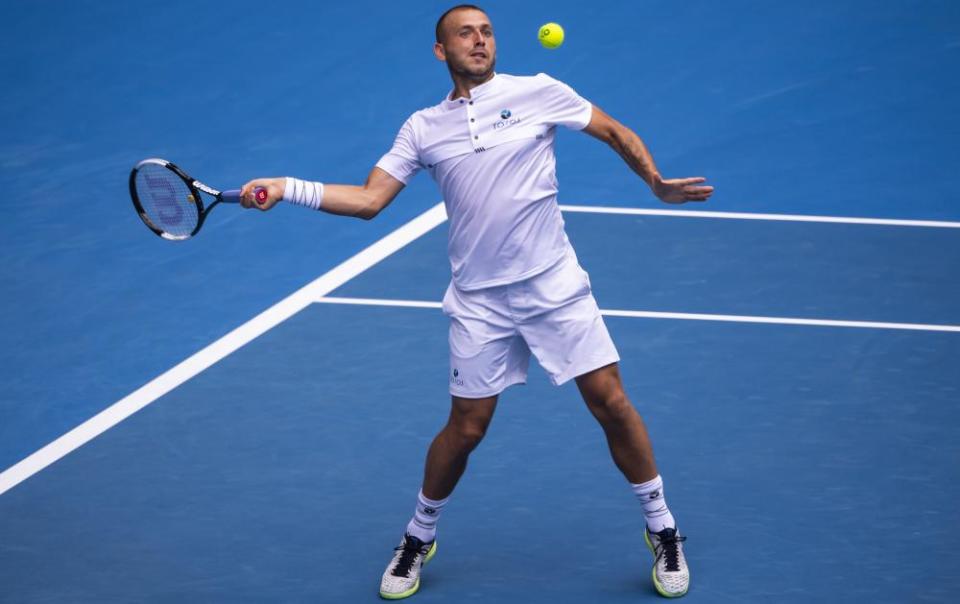Dan Evans smiles in defeat by Roger Federer after 'terrible' time during ban

A year after he found himself “in a pretty bad place” and contemplating retirement from tennis at 27, Dan Evans can smile again, bathed in accolades for three sets against Roger Federer that lit up day three of the Australian Open – and gave the loser much-needed heart.
It took Federer two and a half hours to beat the world No 189 7-6 (5), 7-6 (3), 6-3 on the Rod Laver Arena, a place where he has celebrated victory in the first major of the year six times.
None of that fazed the Solihull adventurer, a plainly gifted player who has survived the excesses of his own personality, including a nine-month ban for testing positive for cocaine. That pitched him towards the edge. This has dragged him back.
As he said later, he was not remotely interested in his sport this time last year. He was still banned, and a nuisance to all around him, he admitted.
“I didn’t watch any of the matches,” he said. “I was in a pretty bad place. The nine months I had off were terrible … [long pause] … Yeah I was in a bad place and that’s just how it is. A lot went on and a lot has gone on – a lot of shit, basically.
“I had a good amount of people around me telling me it wasn’t as bad as I thought, and you come out of it on the other side. Hopefully I can kick on and get back to where I was.
“I was at home in Cheltenham, just in the house – pretty much depressed, actually. I didn’t think I’d ever play again. It’s difficult times, like. I don’t know how I end up still having the people around me who were there. I was difficult to be around. I owe them a lot. That’s what you’ve got family and friends for. Hopefully, they enjoyed this week as much as I did.”
Certainly the spectators rose to his heroics, even if, as ever, the majority were hoping Federer would not be dumped out of the tournament, or even mildly inconvenienced. Evans did more than that.

Buoyed by three decent wins in qualifying, Evans played with freedom, “nothing to lose‚” as he said. He was two points from taking the first set in the tie-break but was over-eager in charging in behind his serve, dumped a difficult volley, shoved the next chance wide and the moment had gone. He saved two set points in the second, broke back with a brilliant backhand winner and forced a second shootout. The third was more straightforward but he tried all the way. Federer was impressed.
In reference to the similarities in their method and tennis philosophy, from the one-handed backhands to the sliced returns, as well as their willingness to attack at every opportunity, he said: “It felt like playing in a mirror a little bit. My thought going in was that I was playing myself, potentially. I had maybe a little more size.”
Evans laughed at that. “I think he meant in game style rather than level.” He was encouraged, though, by Federer’s praise.
Federer continued: “No, I’m not surprised [at how well he played]. I have high regard for Dan. He’s a good player. I’ve seen him play some really good matches over the years. I see why he can cause difficulties to players. He’s got a nice slice, defending the court well. He has the variation, which is always a hard thing to play against. It was very cat and mouse today. Very interesting. I liked the match.”
On Evans’s prospects of ever returning to a career-high 41 in the world, Federer said: “I didn’t even know his ranking. For me he’s a top 100 player. Once you’re 80 or 60 or 40, you can be all those things, and beyond probably. I just think it’s in the details at the end of the day.”
He said it was in Evans’s own hands how well he did from this point of a most interesting career. “How much can you give to the sport? How much are you willing? Can you stay injury-free? Get your ranking up, be really there for the crucial moments? I think he can be top 50 again, no problem.”
That was almost as good as a win. Almost.

 Yahoo Sport
Yahoo Sport 





































